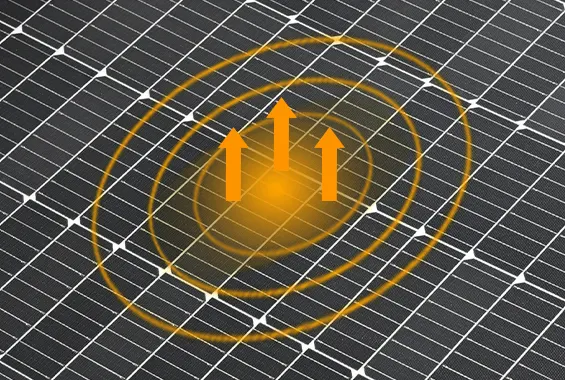What is a Microinverter?
Microinverters are a type of inverter technology used in solar power systems and have gained popularity due to their unique design and numerous advantages over traditional inverter systems.
How do microinverters work?
Microinverters are devices used in solar energy systems to convert direct current (DC) electricity generated by individual solar panels into alternating current (AC) electricity that can be used in homes and businesses. Unlike traditional string inverters, which are connected to multiple solar panels in a series, microinverters are typically installed on a per-panel basis. Here’s how microinverters work:
- Individual Panel Conversion: In a solar panel system with microinverters, each solar panel is equipped with its own microinverter. This means that each panel operates independently, which has several advantages.
- DC to AC Conversion: The primary function of a microinverter is to convert the DC electricity generated by the solar panel into AC electricity. AC is the standard type of electricity used in most homes and buildings, making it compatible with the electrical grid and household appliances.
- Maximum Power Point Tracking (MPPT): Microinverters often include Maximum Power Point Tracking technology (MPPT). MPPT helps the microinverter optimize the output of each individual panel by constantly adjusting its operating parameters to ensure the panel is producing electricity at its maximum potential. This is important because the electrical output of a solar panel can vary due to factors like shading, temperature, and cloud cover.
- Improved Efficiency: Microinverters can improve the overall efficiency of a solar panel system. Unlike string inverters, where the performance of all panels is tied to the lowest-performing panel in the string, microinverters allow each panel to operate at its optimal performance level. This can result in higher energy yields, especially in systems with partial shading or panels with different orientations.
- Monitoring and Control: Many microinverter systems come with monitoring and control capabilities. Homeowners and installers can access real-time data on the performance of each individual panel, making it easier to identify and address any issues that may arise.
- Simplified Installation: Installing microinverters can be simpler in some cases compared to string inverters. Each microinverter is typically attached to the back of its corresponding solar panel, eliminating the need for a central inverter installation. This can reduce installation time and complexity.
- Enhanced Safety: Microinverters are considered safer than string inverters in certain scenarios because they operate at lower DC voltages. This reduces the risk of electrical hazards during installation and maintenance.
- Scalability: Microinverters offer greater scalability because you can add more solar panels to your system one at a time, without the need to upgrade the inverter. This makes it easier to expand your solar system in the future.
Overall, microinverters offer several advantages in terms of system performance, monitoring, and flexibility. However, they may come at a higher upfront cost compared to string inverters, so homeowners and businesses should weigh the benefits against the cost when choosing the right inverter technology for their solar installation.
Benefits of Microinverter
Unlike centralized inverters that connect to all solar panels, microinverters are compact units installed at each individual panel, offering several benefits.
Enhanced Panel Output Optimization
In conventional inverter systems, all panels are linked in series, limiting the entire system’s output to the lowest-performing panel. This limitation can be problematic if one panel is shaded, malfunctioning, or underperforming. Microinverters allow each panel to operate independently, ensuring the system’s overall performance is not hindered by any single panel. This results in increased efficiency and reliability.
Compatibility with Various Panel Types
Traditional inverters are often designed for specific panel types, limiting flexibility. Microinverters, in contrast, are compatible with a wide range of panels, making them adaptable to different solar power systems. This flexibility is particularly valuable for systems that may require future expansion or upgrades, as it simplifies the integration of new panels without replacing the entire inverter system.
Cost-Effective Solutions
Microinverters offer cost advantages in several ways. They are smaller and more compact than traditional inverters, reducing manufacturing and installation costs. This makes them an economical choice for smaller solar power systems or installations in remote or challenging locations.
Simplified Maintenance and Repairs
Microinverters are easier to maintain and repair compared to traditional inverters. Their distributed installation allows for quicker diagnosis and resolution of issues. As a result, maintenance and repairs are typically less expensive and time-consuming with a microinverter system.

Essential considering factors
While microinverters offer many advantages, it’s essential to consider their suitability for your specific solar power system:
- System Size: For very large solar power systems with numerous panels, traditional inverters may be more cost-effective.
- Remote Locations: In remote areas with limited access to maintenance and repairs, traditional inverters might be a better choice.
In summary, microinverters are a versatile option for solar power systems of all sizes. They deliver improved performance, flexibility, and cost-effectiveness. However, it’s crucial to evaluate your unique needs and requirements before deciding to incorporate microinverters into your solar power system. With the right choice, you can enjoy the benefits of a reliable, efficient, and cost-effective solar power system for years to come.











